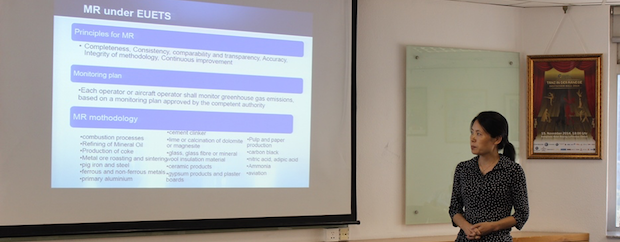
September 2016 - The Chinese government has announced a country-wide emissions trading scheme (ETS) for 2017 which, according to the National Development and Reform Commission (NDRC), will require a wide range of businesses to monitor, report and verify (MRV) their greenhouse gas emissions. The companies covered by the Chinese ETS thus need to familiarise themselves with the requirements of the new scheme.
Against this backdrop, the AHK Greater China Beijing, on behalf of the German Federal Ministry for the Environment, Nature Conservation and Nuclear Safety (BMU), invited some 30 business representatives and experts to a network meeting held on August 22nd. At that meeting, two specially selected speakers gave presentations on calculating and monitoring emissions in industrial enterprises, and on the monitoring, reporting and verification (MRV) system to be used in the Chinese ETS.
Tian Pin from Bureau Veritas informed the audience about the underlying requirements for businesses wanting to join the scheme. Foreign businesses with high levels of carbon emissions, and particularly those operating in energy-intensive sectors, will be included in the Chinese ETS if they meet the set criteria. Tian Pin also made recommendations regarding methodologies and processes for calculating emissions, saying that to prepare adequately for the new national ETS, businesses should also draw on the official training materials recently published by the NDRC. Another option, he said, would be to adhere to the internationally accepted standards PAS 2050 and ISO 14064 to first identify the emissions caused in the manufacture of a particular product and then quantify them at a later date.
The second speaker, Zhang Lixin from the China Quality Certification Center (CQC), gave an overview of the MRV system to be used in the Chinese ETS and compared it with existing systems operated in the EU and the US. For MRV under the EU ETS, verification offices must fulfil special criteria – for example, by establishing an acceptable quality management system or mechanisms to ensure neutrality and objectivity. China focused on these criteria when developing its own verification system. The required professional qualifications for Chinese verifiers are, according to Zhang, also comparable with the respective requirements of the MRV system used in the US State of California.
In the ensuing discussion, topics focused on the planned MRV system, the verification bodies and the need for further training and capacity-building to prepare for the Chinese ETS. Those attending the event all agreed that in addition to accurate reporting of emissions data at business level, further institutional preparation would be needed on the part of the authorities. It was felt that the businesses, the responsible authorities and the external verification bodies should all train their staff to ensure they have the required level of expertise.
An in-depth report on the network meeting is contained in the August issue of the Econet Monitor magazine published by the environmental experts at the AHK Greater China in Beijing. The article is also available for download online.
Note: The publication is available only in German.
Cookie Settings
Marketing-Cookies werden von Drittanbietern oder Publishern verwendet, um personalisierte Werbung anzuzeigen. Sie tun dies, indem sie Besucher über Websites hinweg verfolgen.
Provider:
Statistik Cookies
Statistik-Cookies dienen der Analyse und helfen uns dabei zu verstehen, wie Besucher mit unserer Website interagieren, indem Informationen anonymisiert gesammelt werden. Auf Basis dieser Informationen können wir unsere Website für Sie weiter verbessern und optimieren.
Provider:
Erforderliche Cookies
Erforderliche Cookies sind für den reibungslosen Betrieb der Website zuständig, indem sie Kernfunktionalitäten ermöglichen, ohne die unsere Website nicht richtig funktioniert. Diese Cookies können nur über Ihre Browser-Einstellungen deaktiviert werden.
Provider: